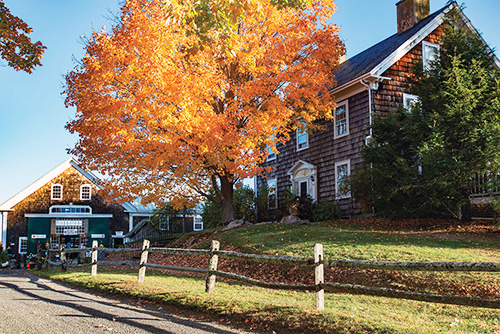August 10, 2021
Stewards of the Land: A Massachusetts’ farm’s road to net zero

Climate change and environmental protection have been hot topics in recent years. In its first few days, the Biden Administration committed to tackling climate change nationally and beyond. At a climate change hearing held in April, the Administration announced its plans to achieve 50-52% reduction of greenhouse gases from 2005 levels by 2030. So what does this mean for agriculture here in the Northeast?
Many Northeast states have adopted their own goals, with the majority aiming for an 80-85% reduction in greenhouse gas emissions by 2050. Agriculture is critical in achieving these goals as it generates about 10% of U.S. greenhouse gas emissions and can play a key role in mitigating them.
Any type of food production comes with an environmental footprint, and natural-resource based businesses depend on the environment, so the concept of climate smart agriculture is not new to the industry. Natural resource-based businesses have continued to evolve their practices as new research is developed to further protect the land and waters. This includes practices such as no- or reduced-till farming, improved nutrient management, and the use of cover crops, among other practices, many of which have been used for decades. Increasingly, agricultural producers are looking into solar arrays, wind turbines, anaerobic digesters and other renewable energy practices to help protect the environment, while also reducing costs.
In the coming weeks, we will feature Northeast agricultural producers who have implemented these types of practices in their operations and highlight the impact these practices have had on their business and the environment. While our Stewards of the Land series will highlight just a sampling of agricultural producers, it will provide insight into the variety of practices being implemented to benefit the environment. We’ll kick off the series at Russell Orchards Farm Store and Winery, a 120-acre fruit and vegetable farm in Ipswich, Massachusetts.
How it all began
According to Miranda Russell, Russell Orchards Farm Store and Winery has always strived to be good stewards of the land. As technology has improved and culture evolved, there have been more tools and support available to make achieving this goal easier and more economical. “Even just 20 years ago, you weren’t able to just hop on the internet to find such a huge wealth of information,” said Miranda. “Now people are publishing their success, their failures, etc., and you can learn a lot from what others are sharing.”
The farm aims to be net zero, meaning they are looking to offset the amount of greenhouse gases produced by their activity. But Miranda acknowledges that with the amount of resources the business currently uses, that’s going to be something they need to consistently hammer away at.
Repurposing waste
The Russells were able to start down their road to becoming net zero in the early 2000s. One of their first explorations was to use the waste oil from their cider donut machines (a major draw of their farm store) and process it into biodiesel. Over the past 20 years, if not fully, then a portion of the diesel in their engines is made with biodiesel that is coming right out of the donut machines.
Unfortunately, it was a learning process. “The biodiesel is great, but it can be hard on particular engines, so we made some mistakes along the way and ruined a few engines,” said Miranda. “But we’ve since learned the proper ratio, and it’s been an important touchstone for our customers.”
About 12 years ago, the farm installed an outdoor wood boiler. This has enabled them to use the clippings from the orchard trees and clearing (deadwood from doing maintenance in their woodlands) to heat the greenhouse and a couple of floors in the farm’s office buildings and residence.
Effective soil management
The farm also utilizes cover cropping, a practice that keeps the ground covered year-round, which is shown to sequester carbon from the atmosphere, while keeping the soil healthy. The 2017 Census of Agriculture reported a 50% increase in cover cropping since the previous census in 2012. This practice lessens erosion and increases organic material in the soil, which feeds the soil throughout the year to make it healthier for the long term.
“It’s just good soil management,” said Miranda. “It’s something that if you don’t do it, you’ll be sorry.”
Improved nutrient management
Another technique the farm is using is called fertigation in which fertilizer is applied through the irrigation system, enabling the operation to irrigate and fertilize at the same time. This allows the farm to have more control over the moisture and dampness of a particular crop so they can go a longer stretch without having to spray.
What’s next?
In recent years, the farm has installed a solar rooftop array on their worker housing which provides all the electricity for their housing. Their five-year plan is to install a couple more rooftop arrays and some ground mount arrays. Short term, they’re looking to install some Electric Vehicle (EV) charging units in the parking lot and maybe another solar hot water setup.
“It can be overwhelming to think about where to begin, so what we’ve done is picked a project and tried one thing at a time,” said Miranda. “And when an opportunity arises, you can’t delay. You’ll always be busy, there will always be another project or something else that needs to be fixed, so you just have to strike when the iron is hot.”
To learn more about Russell Orchards Farm Store and Winery, visit their website at RussellOrchards.com.
Next week, Farm Credit East’s Stewards of the Land series will travel to Western New York to learn more about the climate smart practices a dairy operation has implemented. Stay tuned!




